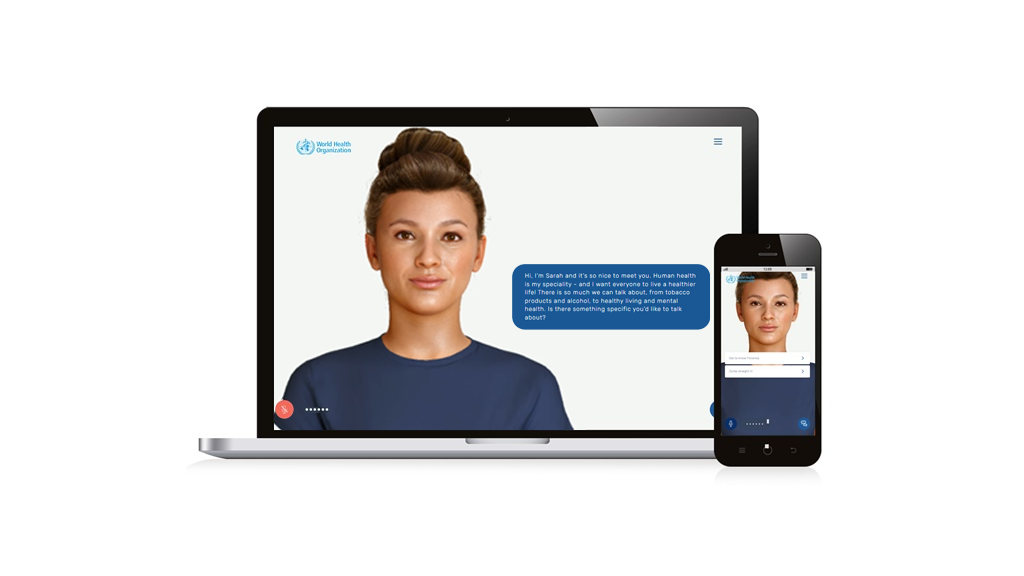Prior to World Health Day, which focuses on the theme “My Health, My Right,” the World Health Organization (WHO) announced the launching of the digital health promoter prototype named “S.A.R.A.H”, which possesses advanced empathetic responsiveness through innovative utilization of Artificial Intelligence (AI).
S.A.R.A.H is an advanced artificial intelligence health assistant, representing a leap in health information avatars powered by AI, utilizing modern linguistic models and sophisticated techniques. Sarah can engage with users around the clock in eight different languages on various health topics, across any device.
The WHO-affiliated digital health promoter undergoes training to provide information on key health topics including healthy habits and mental health, with the aim of assisting individuals in improving their journey towards good health and well-being. The goal is to provide an additional tool for individuals to exercise their right to access healthcare, wherever they are.
Sarah, also known as S.A.R.A.H, has the capability to aid individuals in developing a better understanding of risk factors leading to major causes of death worldwide, including cancer, heart disease, lung disease, and diabetes. It can assist people in obtaining updated information on smoking cessation, physical activity, healthy eating, stress reduction, among other things.
S.A.R.A.H can help people understand more about quitting smoking, adopting an active lifestyle, following a healthy diet, and reducing stress.
Relying on generative AI instead of predefined algorithms, S.A.R.A.H provides more accurate real-time responses and empathetic answers. “Sarah” operates on the biological AI platform developed by “Soul Machines”.
“The future of health is digital, and supporting countries in harnessing the power of digital technologies for health is a priority for the World Health Organization,” said Dr. Tedros Adhanom Ghebreyesus, WHO Director-General. “Sarah offers us a glimpse into how AI can be used in the future to improve access to health information in a more interactive manner. I invite the research community to assist us in continuing to explore how this technology can reduce disparities and help individuals access reliable and up-to-date health information.”
Now, S.A.R.A.H is supported by generative artificial intelligence instead of a preordained algorithm or scenario, helping it provide more accurate real-time responses; engaging in wide-ranging personal dialogues that mimic human interactions more precisely, and delivering precise and empathetic responses to users in a non-judgmental environment. This technology is supported by biological AI from Soul Machines.
The World Health Organization calls for continued research on this new technology to explore potential benefits for public health and better understand the ethical challenges it poses, including fair access, privacy, safety, accuracy, data protection, and bias.
The ongoing assessment and continuous improvement process as part of this project emphasize the WHO’s commitment to make health information more accessible to people while maintaining the highest ethical standards and evidence-based content. Developers, policymakers, and healthcare providers need to address these ethical issues and human rights when developing and implementing artificial intelligence to ensure that everyone benefits from it.
The SARAH project aims for continuous learning and the development of a model that can inspire reliable, responsible, and accessible information.
Previously, earlier versions of S.A.R.A.H were used to disseminate vital public health messages under the name Florence during the COVID-19 pandemic, covering topics such as the virus, vaccines, smoking, nutrition.
Health, and physical activity.
The World Health Organization continues to utilize various digital tools and channels to disseminate and promote health information, including social media, chatbots, channels, and text messages.
Concluding in 2020, the World Health Organization launched a new program to stop tobacco use called the “Access to Stop Smoking” initiative, which connects users with virtual health workers using artificial intelligence for nicotine replacement therapies. The online application can be used for free and was first tested in Jordan.
After two years, the National Institute of Health began working on its own artificial intelligence program, Bridge2AI, which plans to invest $130 million over four years to accelerate the use of artificial intelligence in medical and behavioral health research.
In 2023, the United Kingdom collaborated with creative artificial intelligence companies OpenAI and Deep Mind for research and safety purposes. The aim of this collaboration was to explore how governments can use artificial intelligence to better serve healthcare and education nationwide.


